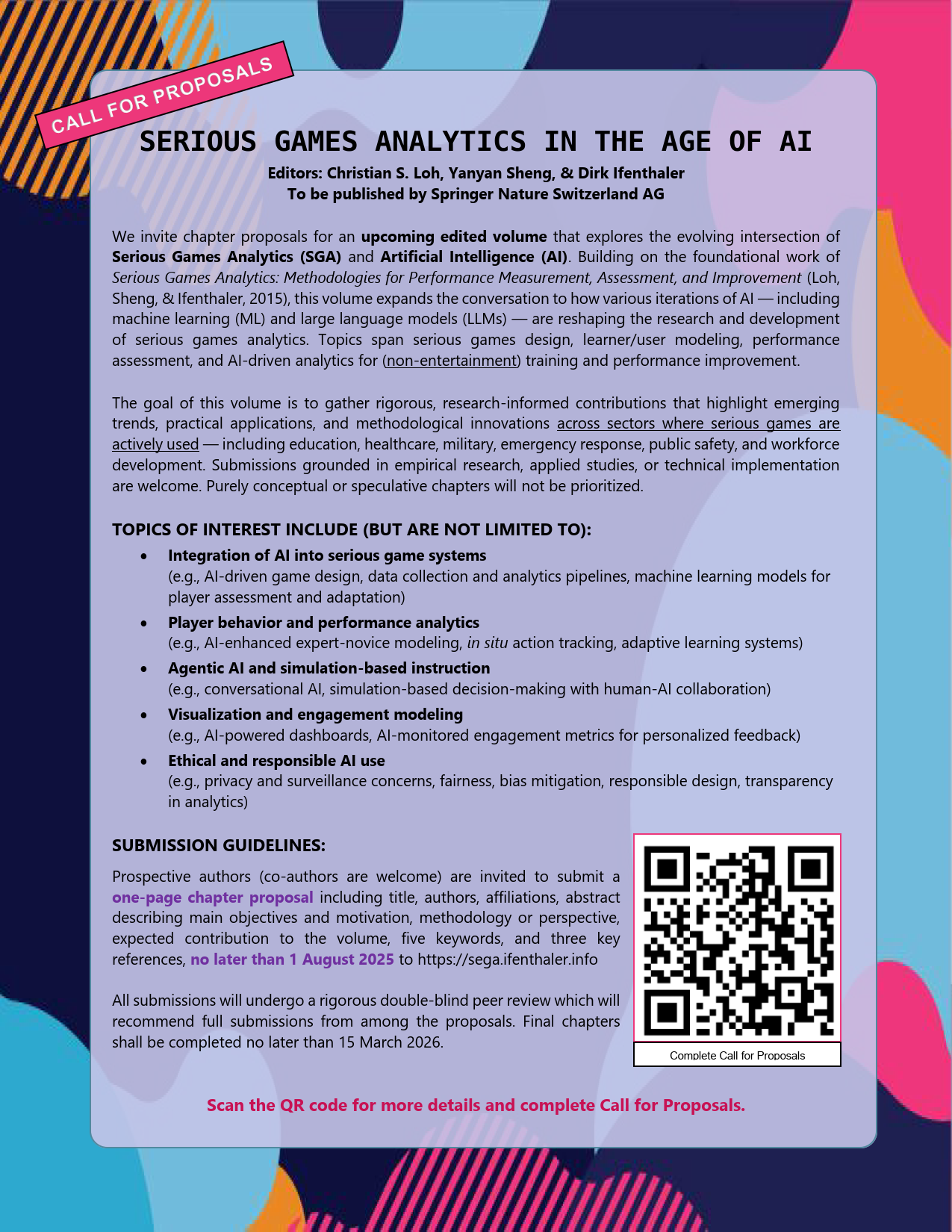
“Advances in Game-Based Learning” Series:

![]()
Christian S. Loh (Southern Illinois University, USA)
Yanyan Sheng (University of Chicago, USA)
Dirk Ifenthaler (University of Mannheim, Germany and Curtin University, Australia)
— to be published by Springer Nature Switzerland AG, Cham
We invite chapter proposals for an upcoming edited volume that explores the evolving intersection of Serious Games Analytics (SGA) and Artificial Intelligence (AI). Building on the foundational work of Serious Games Analytics: Methodologies for Performance Measurement, Assessment, and Improvement (Loh, Sheng, & Ifenthaler, 2015), this volume expands the conversation to how various iterations of AI — including machine learning (ML) and large language models (LLMs) — are reshaping the research and development of serious games. Topics span serious game design, player/learner modeling, performance assessment, and AI-driven analytics towards training and performance improvement.
The goal of this volume is to gather rigorous, research-informed contributions that highlight emerging trends, practical applications, and methodological innovations across sectors where serious games are actively used — including education, healthcare, military, emergency response, public safety, and workforce development. Submissions grounded in empirical research, applied studies, or technical implementation are welcome. Purely conceptual or speculative chapters will not be prioritized.
Topics of Interest include (but are not limited to):
- Integration of AI into serious game systems
(e.g., AI-driven game design, data collection and analytics pipelines, machine learning models for player assessment and adaptation) - Player behavior and performance analytics
(e.g., AI-enhanced expert-novice modeling, in-situ action tracking, adaptive learning systems, real-time feedback) - Agentic AI and simulation-based instruction
(e.g., conversational AI and NPCs, intelligent tutoring systems, simulation-based decision environments with human-AI collaboration) - Visualization and engagement modeling
(e.g., AI-powered dashboards, personalized feedback systems, motivation and engagement metrics in serious games) - Ethical and responsible AI use
(e.g., privacy and surveillance concerns, fairness, bias mitigation, responsible design, transparency in analytics)
![]()
Tentative Sections:
Section 1: Foundations of Serious Games Analytics in the Age of AI
- Introduction to Serious Games Analytics in the Age of AI — Overview of how AI technologies (from data modeling to intelligent behavior) are shaping the field of serious games analytics.
- Evolving Methods for Data Collection in AI-Enhanced Serious Games — Capturing gameplay and learner interaction data to support adaptive and intelligent analytics.
- From Machine Learning to Modern AI Models in Serious Games — Examining how AI methods, including LLMs, multimodal AI, and foundation models, are integrated into serious game research and development.
Section 2: Analytics for Behavior, Learning, and Performance
- AI for Real-Time Assessment and Feedback — Leveraging AI tools to generate responsive and personalized feedback during gameplay.
- Behavioral and Learning Analytics in Serious Games — Using AI to track, analyze, and interpret user actions, strategies, and decision patterns.
- Modeling Skill Development and Expertise through AI — Identifying and visualizing progression from novice to expert based on gameplay data.
Section 3: AI-Enabled Interactions, Agents, and Adaptive Instruction
- Conversational AI, NPCs, and Intelligent Tutors in Serious Games — Exploring how AI agents support learner engagement, instruction, and feedback.
- Adaptive Decision Environments and Simulation-Based Training — Designing AI-driven experiences that evolve based on player choices and performance.
- Human-AI Partnerships in Game-Based Learning — Supporting instructional goals through AI-human collaboration and assistive AI roles.
Section 4: Visualization, Engagement, and Learning Experience Design
- Interpreting AI-Driven Analytics through Visual Tools — Techniques for presenting and utilizing AI-derived insights in instructional or training settings.
- Embedded Learning Analytics and In Situ Assessment — Integrating learning diagnostics into gameplay without interrupting immersion.
- Gamification, Personalization, and Motivation via AI — Enhancing learner engagement through AI-informed adaptive game mechanics and rewards.
Section 5: Ethical Considerations and Applications Across Domains
- Ethical Design and Use of AI in Serious Games Analytics — Addressing fairness, transparency, data privacy, bias mitigation, and responsible innovation in the design and deployment of AI-integrated systems.
- AI-Driven Serious Games for Health, Rehabilitation, and Therapy — Applying AI to support physical, cognitive, or clinical outcomes through personalized and adaptive gameplay environments.
- Simulation and Training in Defense, Law Enforcement, and Crisis Response — Leveraging AI for high-fidelity simulations and adaptive decision training in safety-critical and high-stakes domains.
Section 6: Future Directions and Research Frontiers
- Emerging Trends and State-of-the-Art Innovations in AI and Games — Highlighting frontier technologies, tools, and methods shaping the next decade.
- Challenges, Gaps, and Future Research in AI-Enhanced Serious Games — Identifying conceptual, technical, and pedagogical challenges for researchers and practitioners.
![]()
Submission Guidelines:
Prospective authors (co-authors are welcome) are invited to submit a one-page chapter proposal including title, authors, affiliations, abstract describing main objectives and motivation, methodology or perspective, expected contribution to the volume, five keywords, and three key references, no later than 1 August 2025.
All submissions will undergo a rigorous double-blind peer review which will recommend full submissions from among the proposals. Accepted chapters shall not exceed 8,000 words and shall be completed no later than 15 March 2026. Specific guidelines will be made available after 01 October 2025.
Proposal submission link: https://sega.ifenthaler.info/
![]()
Timeline:
- Proposal deadline: August 01, 2025
- Notification of acceptance: October 01, 2025
- First drafts of chapters due: March 15, 2026
- Chapters returned with reviewer feedback: July 01, 2026
- Final chapters due: September or October 2026
 Serious Games Analytics 2 Call for Proposal (PDF)
Serious Games Analytics 2 Call for Proposal (PDF)